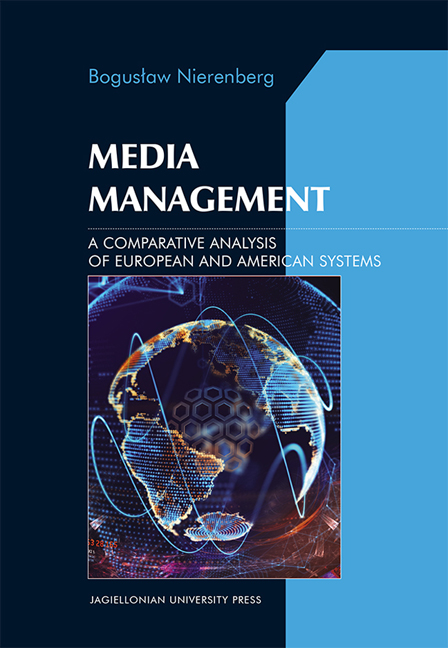Book contents
- Frontmatter
- Dedication
- Contents
- Introduction
- Epigraph
- Part 1
- Part 2
- Part 3
- Chapter 7 Managers and Journalists
- Chapter 8 Strategies of Media Organizations. Value for Consumers
- Chapter 9 Legal and Ethical Aspects of Media Management
- Chapter 10 Developmental Trends of Media Organizations. Indicators of the Future of the Media
- Summary
- Bibliography
- Lists of Tables, Figures and Charts
Chapter 7 - Managers and Journalists
from Part 3
Published online by Cambridge University Press: 10 January 2018
- Frontmatter
- Dedication
- Contents
- Introduction
- Epigraph
- Part 1
- Part 2
- Part 3
- Chapter 7 Managers and Journalists
- Chapter 8 Strategies of Media Organizations. Value for Consumers
- Chapter 9 Legal and Ethical Aspects of Media Management
- Chapter 10 Developmental Trends of Media Organizations. Indicators of the Future of the Media
- Summary
- Bibliography
- Lists of Tables, Figures and Charts
Summary
This chapter will deal with people who manage the media (quartermasters and managers) and media workers, primarily journalists who for many decades exemplified the essence of the media. In the 19th century and for a good part of the 20th century, journalism was perceived as a public service. In the 19th century it was even thought that a journalist performing his or her duty should not receive any monetary compensation so as not to be dependent on the cash buyer. The notion of the “journalist” today has been increasingly superseded by the notion of a “media worker” and not only and not primarily in its semantic meaning. In turn, distinction into media quartermasters and managers is significant as every manager on a level suitable for their competences is a media quartermaster as well. On the other hand, not every media quartermaster is a manager. For instance, it is hard to call Zygmunt Solorz a manager who deals with direct management of a media organization. In fact he is a media quartermaster who profoundly influences TV Polsat as the major shareholder. His decisions or lack of them also predestines the situation within the entire business. Thus, an analysis of cases of chosen media careers, both quartermasters as well as managers and journalists, will be included in this chapter.
Human resources in media
In the monograph Media Management. In the Age of Giants one finds an interesting anecdote that can serve as a great starting point for discussing motivation and productivity in the media. Professor Bob Gassaway of University of New Mexico recalls his job interview which he had many years before with the publisher of a journal from Missouri. While looking around the office, Gassaway asked his prospective boss about the number of people working in the editorial office. “‘Well’ – the old editor said slowly, bending over the desk – ‘as far as I know, more or less one in three [Herrick 2003: 67].’” Human resources in the media along with their motivation to increase productivity have always posed a major challenge for managers, but a substantial research field as well.
- Type
- Chapter
- Information
- Media ManagementA Comparative Analysis of European and American Systems, pp. 125 - 146Publisher: Jagiellonian University PressPrint publication year: 2016



